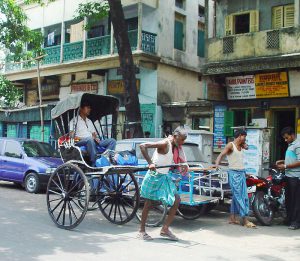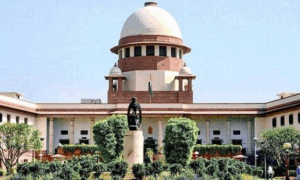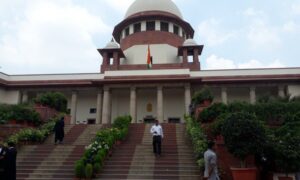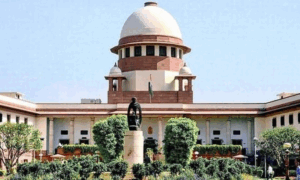
Image: Wikipedia
By Nibedita Bayen
“What kind of a country we are living in. This has not happened in the most of the primitive time and the world” observed the Supreme Court, as reported by The Statesman on 16th July 2014. The apex court of India commented such by observing the atrocities and exploitation against the migrant labourers in India and called for the policy to prevent such cruelty for the sake of human rights. The approach of the Apex court to formulate policy for migrant labourers helped me to generate new questions and texts about disease governance by judicial, legislative and decentralisation of power. In this context, I do like to discuss the disease, which has succeeded in creating its position in our literature and had compelled colonial rulers to establish public health system in Kolkata and in other parts of India. This disease is known as malaria.
Malaria the disease is of the tropics, but it seems to have plagued Europeans more than we the people of the tropics. How? Because the incidence and perpetuation of this disease have brought into question the historicity of colonisation and decolonisation; the historicity of nationalism and globalisation.It has questioned the sociology of “social medicine” along with issues of legitimacy and marginalisation. It was observed that despite centuries of “European” encounter with this tropical phenomenon of malaria it has remained as “mystic” and “mysterious” to the European as it was when they first found it in Africa and Asia. Despite complete paradigmatic circumambulation from the medical approach to DDT to re-medicalization, the hapless marginalised of India and in particular, Kolkata has not found any relief. Despite great NVBDCP and other such initiatives of governmentality, the poor migrant worker is still compelled to depend upon the “Ojha”(traditional healer), quack and faith healer. Despite great “war” on malaria poor still, prefers to go to the private doctor than the government clinic. The poor migrant worker who is seen as the vagrant, and being such her/his vagrancy becomes the very reason for the perpetuation of the government an“war” on malaria. Thus as is the nature of the modern state, its very failure is the condition for its existence, failure to contain malaria is the very reason for the continuation of malaria eradication programmes in various avatars. Now, what should be the role of migrant workers in this situation? And what should be the role of the citizen? The citizen more or less sees the slum dwelling migrant labourer as its other. Should the migrant worker agitate and in any such agitation will she/he get any support of the fellow citizen?
Migrant labourers are the “object” of medicalization of malaria and medicalization of their body in Kolkata. While migration has been diagnosed as one of the root causes for the spread of malaria in India, migrant labourers are incorporated as one of the categories of people who have the strong possibility to spread the disease. However, both the central and state government have not yet decided any policy regarding special medical attention to migrant labourers and address the issue of migration to control the vector.
Migrants have never raised any voice against anyone to address their way of life amidst the invisible presence of basic amenities. They live in the dilemma of legal and illegal taglines that may be stuck on them anytime by governmentality. The migrant labourer has the fear of displacement from the place from where they get their identity of breadwinner to their wife, children and other family members. They are aware of their vulnerability, that it is the constantly moving relationship and the force that each of these concepts exerts on the other that come to define the conditions of possibility for the emergence of claims over citizenship. In suggesting that citizenship is a claim rather than a status, which one either has or does not have, the precariousness as well as the promise of “belonging” to a polity (Das 2010).
Suppression of the voice of migrants is the regional political strategy to address the issue of malaria governance. The policy of the government to tackle the migrants is to treat them with the free medical setup. Therefore, common people will not be able to raise the issue of human rights or ignorance. Moreover, their inability to access the knowledge about the disease and most importantly, their relationship with their employer does not allow them to express their illness rather they are obliged to change their everyday life pattern to thrive.
Therefore, the cultural pressure and the strategy of the government/ employer have been creating the scope for both employer and government to be legitimised by their subject. Acceptance of these strategies by the migrant labourers gives permission to the government to validate the embryonic medicalization of malaria and body of migrants in both domestic and international stages. Such way the government/ employer appear to be the curer of the disease, and caretaker of their body. Thus, migrant labourers who have never been registered in any government document (like ration card /voter card/Aadhaarcard) and as they select their place of work in community, their specific areas become the moorings of malaria governance since they are welfare dependence and ignorant; and in this manner they fall prey to “silence” and “objectification”. The complex practices on the part of the legal and administrative machinery of the State make the migrant worker an unstable category. Further, people’s own notions of the legal and the illegal are in play here and have an important impact on how the State comes to define rights over housing or electricity or water or health checkups at government clinics. There are claims that derive from diffused notions about preserving life that bind residents and the State together. For the State, the recourse to juridical notions as embedded in such constitutional notions as the right to life, becomes necessary to justify its actions especially when it sets aside the letter of the law in favor of other notions derived from the imperative to preserve the life of the individuals and the community (Das 2010).
Foucault (2003) famously argued and which seems appropriate in this context that the emergence of the biopolitical State in the long transformation from the eighteenth to the nineteenth century marked a new understanding of the idea of life as it came to be seen as an entity to be managed by the State. Rabinow (2006) succinctly explains that the movement from biopower to biopolitics in Foucault as he shows how the two poles of biopower – that of the anatomo-politics of the human body and that of the regulatory controls over population came to be conjoined in the nineteenth century. A politics of “bio” emerged so that life as a political object was turned back against the controls exercised over it in the name of claims over the right to life, to one’s body and to health. Biopolitics as distinct from biopower, in this view, refers not only to the regulatory power of the State as reflected in law but must include truth claims, strategies of intervention on collective existence in the name of life and health; and finally modes of subjectification by which individuals are made to work upon themselves in subtle ways that make such pursuits as the desirability of preserving health as part of the common sense of the time ( Rabinow 1992, Cohen 2004, Rose 2007, Das 2010).
The government has been taking various paths and measures to discipline and terrorize these migrant labourers to keep them silent over the deprivation issue. Keeping registers to note down the address and their category of malaria from which they have been suffered and most interestingly doing the household survey once in a week to find larvae of the mosquito in their water containers.
It is also the case that new forms of politics open up the space for continuous surveillance through governmental tactics such as surveys or renewed procedures of verification of documents, though on a model that is almost a parody of Foucault’s model of surveillance since what it generates is the emergence of new forms of brokerage that drain people of their meager resources. The very instruments of surveillance such as surveys and verification of documents provide an opportunity for brokers to emerge from within the community and become a new face of the State.
Instead of a panoramic view of State and citizenship through the Hegelian lens of civil society or the Habermasian notion of the public sphere, the attention to the minutiae of everyday life allows us to bring into view the complex agencies at play here in the claim to citizenship( Das 2010). Migrant labourers are actually humiliated. They accept this humiliation because with humiliation degradation and structural inequality is associated. They live in debasing economic, social conditions due to which they remain incapable of developing their capacity to protest. Therefore, they have been perceived and presented as a legitimate object of humiliation (Guru 2015). Migrant labourers fail to develop their self –respect and tend to take a low view of themselves.
References:
1. Cohen, Lawrence. 2004“Operability: Surgery and the Margins of the State. In Veena Das and Deborah Poole eds. Anthropology in the Margins of the State, Santa Fe: SAR Press, 165-191.
2. Das V (2010). Citizenship as a claim or stories of Dwelling and belonging among the urban poor. Dr. B.R.Ambedkar Memorial Lecture 2010.
3. Faubion D J (Ed) (2000). Michel Foucault: essential works of Foucault 1954-1984, volume 3. Penguin Books.
4. Guru G(Ed) (2015). Humiliation. Oxford University Press. New Delhi
5. Rabinow, Paul. 2006.”Biopower Today”. Biosocieites, no.1, 195-217
6. Rose Nikolas, 2007. The Politics of Life Itself, Biomedicine, Power, and Subjectivity. Cambridge: Cambridge University Press

(Nibedita Bayen is currently working as Assistant Professor of P.R.Thakur Government College, West Bengal, India. Her research interest includes the study of migration, history of disease and medicine, sociology of literature. Views are personal)


















